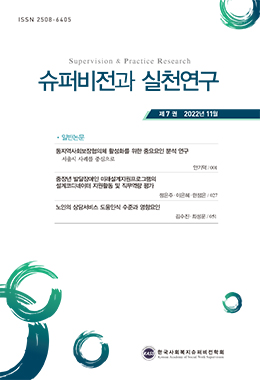본 연구는 중장년 발달장애인 미래설계지원프로그램의 전담인력인 설계코디네이터의 지원활동과 직무역량을 평가하는 것에 목적이 있다. 미래설계지원프로그램에서 설계코디네이터는 발달장애인들이 전체 활동과정을 성공적으로 수행할 수 있도록 밀착전담해서 지원하는 활동을 담당하였기에 이들에 대한 활동평가는 사업의 효과성을 파악하는데 놓쳐서는 안 될 영역이었다. 이를 위해 본 연구에서는 설계코디네이터를 대상으로 설문조사와 FGI의 혼합방법론을 활용하여 조사하였다.
연구결과, 4점 기준으로 지원활동에 대한 전반적 평가는 3.06점, 직무역량 중 태도역량은 3.50점, 지식 및 기술역량은 각각 2.95점으로 나타났다. FGI 결과, 설계코디네이터들은 중장년 발달장애인들이 프로그램을 통해 자립활동에 긍정적인 변화를 보여 보람되었으며, 반면 장애인 분야 실천 경험 부족으로 인한 개별지원의 한계, 보호자들의 자녀 미래에 대한 낮은 기대감과 자유로운 소통의 어려움 등으로 지원활동이 힘들었으며 코로나19로 인하여 지역사회 실천 활동을 계획했던 것에 비해 제한적으로 수행할 수밖에 없었던 것이 아쉬웠다고 하였다.
향후 중장년 발달장애인 지원인력의 전문성 확보와 지속적인 프로그램 지원활동을 위하여 체계적인 슈퍼비전 실시와 예산지원이 필요함을 제안하였다.
The purpose of this study is to evaluate the support activities and job competencies of design coordinators, who are exclusive personnel of future design support programs for the middle-aged people with developmental disabilities. As design coordinators in future design support programs were in charge of closely supporting the overall process of activities in order for people with developmental disabilities to successfully carry out the program, activity evaluation for such coordinators was a sector which should not be overlooked in understanding the effectiveness of the service. The study was carried out through mixed methods research of questionnaire and FGI targeting design coordinators.
The result of the study was that, out of 4, overall evaluation for support activities was 3.06, attitude competency was 3.50, technical competency was 2.95 in terms of job competency. For the result of FGI, design coordinators felt it rewarding when middle-aged people with developmental disabilities showed positive change regarding self-support through the program. On the other hand, they had difficulties because of limitations in individual support resulting from lack of experiences in the field of disability, low expectations from caregivers for their children’s future, hardships in terms of free communication. Also, the coordinators felt bad as they were limited in carrying out programs concerning local community because of COVID-19.
The study suggested the need for expertise in support personnel for middle-aged people with developmental disabilities, systematic supervision and budget support for continuous program support activities.




